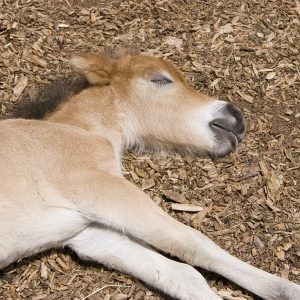
Horse Sleep Patterns and Requirements
Your horse’s ancestors did not have the benefit of a nice, safe environment for sleeping. As with many other prey animals, horses have evolved with the ability to sleep standing up to allow for a quick escape. As herd animals, it is also not uncommon for horses turned out in a group to have one or two lookouts watching for danger while the others sleep. Rarely will all horses sleep at the same time.
What are your horse’s sleep requirements?
While there have been numerous sleep studies done in humans, not as much is known about horses’ sleep patterns. Research groups have observed a few facts over the years, though. Unlike humans, horses do not require an extended period of uninterrupted sleep. Harking back to their wild days, horses needed to be able to function with sleep interruptions from predators or looking out for predators. To avoid sleep deprivation, they do, however, have to lie down for a period of time to achieve a full sleep cycle.
Sleep facts:
- While standing, horses can enter light sleep.
- Several short periods of sleep make up their overall sleep time.
- Deep sleep (REM phase) can only be achieved by lying down because during this phase they lose muscle tone.
- Horses require REM sleep, which often occurs during the late evening hours.
- When horses do not lie down, or refuse to for various reasons, they can experience sleep deprivation.
- Young horses and senior horses may require longer periods of rest.
Factors that can affect your horse’s REM sleep:
Your horse is not much different from you with your 4-inch memory foam. Horses prefer a soft place to sleep. A research group observed horses with and without access to soft bedding. Horses with rubber mats only rarely laid down and did so for less than 30 minutes of REM sleep when compared to horses with soft bedding. Researchers also observed that when the bedded area was large, both high- and low-ranking horses were able to lie down. In comparison, when the bedded space was smaller, low-ranking horses were harassed and unable to lie down like their high-ranking counterparts.*
Other factors they may affect your horse’s sleep:
- Unable to relax because they are alone and may need a companion nearby to feel secure.
- Do not get along with horses stalled or turned out nearby.
- Inclement weather.
- Too much activity or loud noises nearby.
- Insufficient darkness.
- Changes in routine.
- Muscle or joint soreness affecting ability to lie down or get up.
- Pain or illness.
Managing inflammation
If your horse is suffering from inflammation or is a senior horse and struggles to get up and down, consider adding omega-3 fatty acids to support lower levels of inflammation throughout the horse’s body.
Maintaining healthy cartilage and synovial fluid within the joint will decrease inflammation that causes pain, swelling, and the eventual degradation of the joints’ components. Hyaluronic acid, chondroitin sulfate, glucosamine, and manganese sulfate fed at the proper levels have all been shown to reduce the effects of normal wear and tear, limiting damaging inflammation.
Calming supplements
Some horses can benefit from nutrients that support the normal activity of neurotransmitters (the chemicals responsible for transmitting impulses along nerve cells). Ingredients like thiamine (B1), magnesium, taurine, and alpha-lactalbumin help maintain healthy nerve and muscle functions.
Trouble Free is scientifically formulated to support proper nervous system function and help your horse maintain a more confident, focused, and relaxed disposition.
Diet considerations
Mood can also be affected by glucose metabolism. When glucose is quickly digested and absorbed, it can cause spikes in “stress hormones” that make horses edgy and nervous. Choosing feeds high in fat and fiber that are slowly metabolized help to limit hormone spikes.
Pay attention
While little is known about the exact science related to horses and sleep, knowing your horse will allow you to decide whether they are rested or not. Like people, horses’ sleep patterns will vary, so pay attention to what seems normal for your horse and try to address any issues that could be preventing him from relaxing and unwinding.
*Burla, J.B., C. Rufener, I. Bachmann, et al. 2017. Space allowance of the littered area affects lying behavior in group-housed horses. Frontiers in Veterinary Science. 4:23.


